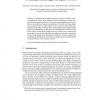Free Online Productivity Tools
i2Speak
i2Symbol
i2OCR
iTex2Img
iWeb2Print
iWeb2Shot
i2Type
iPdf2Split
iPdf2Merge
i2Bopomofo
i2Arabic
i2Style
i2Image
i2PDF
iLatex2Rtf
Sci2ools
EUC
2007
Springer
2007
Springer
Evaluating Mobility Support in ZigBee Networks
Abstract. The deployment of ZigBee networks is expected to facilitate numerous applications, such as home healthcare, medical monitoring, consumer electronics, and environmental sensors. For many envisioned applications, device mobility is unavoidable and must be accommodated. Therefore, providing ubiquitous connection to/from a mobile ZigBee device is crucial for future ZigBee applications. In particular, knowledge of how nodal mobility affects ZigBee routing protocol is of significance. In this paper, our contributions are twofold. First, we dissect ZigBee routing and its support for device mobility, and we analyzed the current provisions in dealing with different mobility cases. Second, we performed a rich set of preliminary tests, illustrating the inefficacy of current standard. Our results indicate that ZigBee device type plays a significant role in determining the routing performance in most mobile scenarios.
Related Content
| Added | 07 Jun 2010 |
| Updated | 07 Jun 2010 |
| Type | Conference |
| Year | 2007 |
| Where | EUC |
| Authors | Tony Sun, Nia-Chiang Liang, Ling-Jyh Chen, Ping-Chieh Chen, Mario Gerla |
Comments (0)

